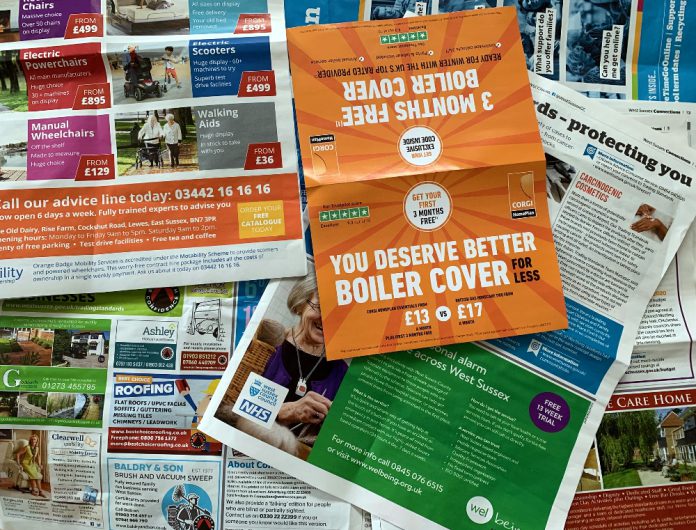We can make huge environmental savings in the UK by changing the law to make unsolicited mail that is posted to residential properties illegal. We could ban junk mail and free pages this month and see the immediate effects by minimising waste and unnecessary post.
Every household across the country and in most western countries across the world receives hundreds of pages of advertising and information through their front doors each year. Families and people of all ages receive communication from companies and organisations that they have not requested into their mail boxes.
Businesses and charities send leaflets, flyers and booklets that are delivered by our postmen or women. Royal Mail have no idea if the message is appropriate to the individual that receives it. The general public then needs to either read this pile and recycle it or simply put it in the bin. Organisations are trying to compete for business and financial donations. They hope that by dropping thousands of marketing letters directly into peoples homes they will gain new customers. More clients purchasing from companies creates much needed jobs in the UK. Often these mailshots are sent by a small local business to a specific location or areas.
However this activity uses paper and printing ink which is harmful to the environment. Sometimes a company or charity will send ‘gifts’ such as pens, cards or coasters which adds further to the waste of resources. It takes resources to deliver these marketing promotions and uses fuel. It also takes power and energy to collect and recycle these papers.
Sometimes the unrequested magazines are enclosed in plastic wrapping which is then single use and has to go to land fill. Phone book pages are big fat publcations with hundreds of sheets of paper that hardly anyone looks at, as virtually all adults aged 16 to 34 years have internet access and 90% of those over 35 are web users. (1)
The ClimateChange Act (2008) contains “a target requiring emissions reductions by at least 100% by 2050.” The climate is changing because of “greenhouse gases and the bulk of emissions derive from our demand for energy. The largest contributor is carbon dioxide (CO2) emitted when fossil fuels are burnt.” (2) Therefore completely stopping superfluous communications that result in the burning of fossil fuels will help to ensure a better planet, for future generations.
It would also be a good idea to add to new legislation that correspondence magazines from the council should be requested in advance by residents as 43% of people in a recent survey said they wanted the West Sussex Connections electronically or not at all. (3)
Forward thinking companies such as Ikea have digital versions of all their product collections available online to download. The Swedish retailer has invited consumers to pick up a copy from their shops. Ikea have stopped sending out catalogues to everyone in postcodes within driving distance to their store this year and also stated:
“Our catalogues are printed on totally chlorine-free paper and contain at least 10-15% post-consumer waste. No rainforest or old-growth fibres are used. The pre-press process is 100% digital, which means no film is used and none of the associated chemicals. No optical brighteners are used on the paper.”
Websites and email, sports and arts sponsorship, television advertising and radio advertising are some of the greener options that could be used instead of sending irrelevant post in order drive fresh sales and gain support. Compromises will need to be made in order to reach our Climate Change targets and prohibiting inappropriate junk mail and downloading content whenever possible is a simple ‘eco quick win’ we can all do now.
References:
(1) Office for National Statistics IT Industry Users
(2) The Committee on Climate Change
(3) West Sussex Connections October 2019 page 2

